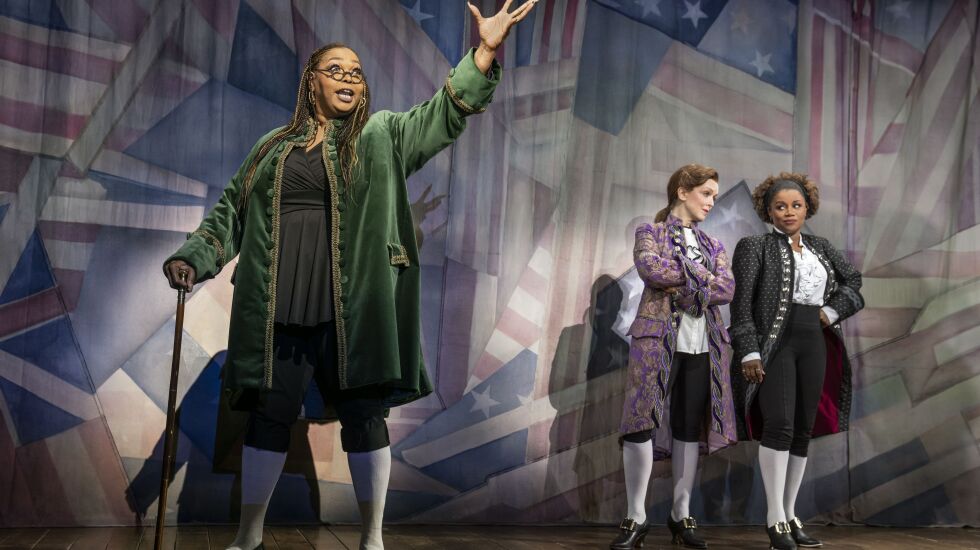The musical “1776,” depicting the debate leading up to America’s declaring independence from Great Britain, won the Tony Award for best musical in 1969.
It beat “Hair.”
That’s hard to fathom now. “Hair” remains one of the seminal American musicals, with a brilliant rock ’n’ roll score, capturing the late ’60s counter-culture along with the Living Theatre-influenced theatrical aesthetics of the era.
“1776,” on the other hand, is, let’s face it, a middling and only occasionally revived musical. But the relevance of its topic — America itself — never goes away. It follows John Adams, Benjamin Franklin and Thomas Jefferson as they push the Second Continental Congress to declare a new nation, leading the drafting and debating of the Declaration of Independence.
“We’ve spawned a new race here,” argues Franklin to the English-loving Pennsylvanian John Dickinson. “Rougher, simpler, more enterprising, less refined. We’re a new nationality. We require a new nation.”
The oft-rousing and well-truncated book by Peter Stone — celebratory but not without a recognition of the deeply imperfect compromises the union is built on — is wrapped into a standard-issue musical comedy aesthetic and peppered with fundamentally forgettable songs by Sherman Edwards.
For the Tony Award choice, political context helps explain. At the time, we had over half a million troops in Vietnam, with televised updates on the daily return of soldiers in body bags. “Hair” was a hit; “1776” was a patriotic morale-booster.
Fast-forward 50-some years, and we now have a revival of “1776” that attempts to marry a contemporary theatrical aesthetic with this traditionalist show. Like “Hamilton,” this production of “1776,” directed by Jeffrey L. Page and Diane Paulus, casts a racially and ethnically diverse cast to embody the Founding Fathers. In this case, the cast consists of performers identifying as female, trans, nonbinary, and gender non-conforming. And like the recent, extremely controversial version of “Oklahoma!” — which ended with the heroes covered in blood — it pokes provocatively at American myth-making.

I know that’s a lot of comparisons, but this is in fact a show where the directors want you to be a bit self-conscious, to be thinking while enjoying. They want you to be aware of the performers’ relationships to the characters they play. Brooke Simpson, who told us of her Native American heritage when she made a land acknowledgment before the start, plays The Courier, who delivers dispatches from Gen. George Washington to the Congress. Her performance of “Momma, Look Sharp,” a song told from the perspective of a dead soldier watching her own funeral, is the most effective moment of this touring production. It reminds us quite openly of the unacknowledged deaths of those who occupied this land before its colonization, while also engaging deeply with grief.
Unfortunately, there aren’t enough moments like that, where the casting or staging truly activates the text and song with added dimension that comments both on perspectives absent in Philadelphia in 1776, as well as those unconsidered when Stone and Edwards wrote about “1776” in 1969.
Even when the directors clearly want to add that sensibility, they stumble. For example, the addition of a silent enslaved person (Jill Marie Vallery) to serve Thomas Jefferson (Nancy Anderson) — supposed to be Sally Hemings’ brother Robert — feels too fleeting, too much like a footnote. And during the song “The Egg” — America is being born, get it? — the use of projected protest scenes from other eras comes across as medicinal virtue-signaling.
The cast here is game for the challenge. Many members come from the Broadway incarnation, although mostly playing other parts than they did in New York. As our catalysts, Gisela Adisa as John Adams captures an obsessive impatience, and Liz Mikel as Benjamin Franklin brings both ego and wit. As President of the Congress, Oneika Phillips conveys trustworthy nobility in a show that both honors and ridicules politics.

The biggest numbers go to the biggest opponents of independence, with Joanna Glushak, as Dickinson, mixing comedy and earnestness in “Cool, Cool Considerate Men,” and Kassandra Haddock, as slavery-defending Southerner Edward Rutledge, turning from charming to accusatory with “Molasses to Rum,” the most elaborately choreographed number (by co-director Page) in a show that could use more creative movement.
With its high-concept take on Stone’s effective narrative, the show overall is enjoyable if spotty. To me, this “1776” feels like a rough draft of what it ultimately wanted to be, but still has moments of bracing inspiration.







